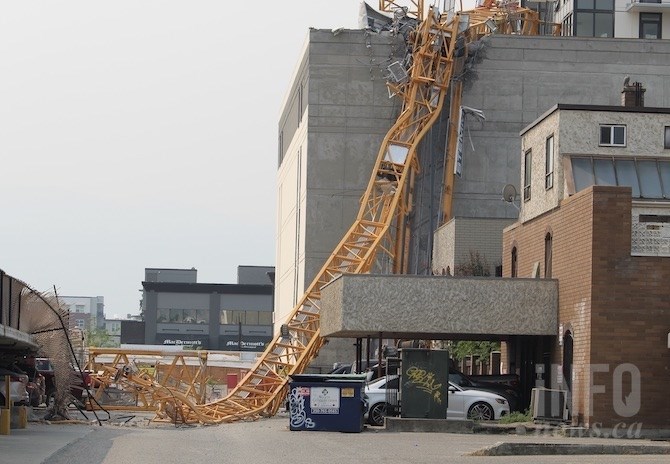
(ROB MUNRO / iNFOnews.ca)
July 15, 2021 - 6:00 AM
Frank Carr has been a union rep in the B.C. crane industry for 21 years and cannot recall a single fatality from tower crane accidents in B.C. until five people died in a crane collapse in Kelowna on Monday.
“No fatalities and definitely none to this extent that I can recall,” the business representative for the International Union of Operating Engineers told iNFOnews.ca today, July 14.
There have been fatalities involving mobile cranes but not tower cranes, he said.
The most recent high-profile fatal tower crane accident was in Seattle on April 27, 2019 when a crane that was being dismantled fell into the street, killing four, including two crane operators and another two people in cars.
READ MORE: Five men dead in Kelowna crane collapse
In 2008, a crane collapse in New York killed six workers and one resident of a nearby building. In that same year, another seven workers were killed in a crane collapse in Cai Lan, Vietnam.
The worst crane collapse in world history came in September 2015 when 111 people died after a crane collapsed into the Grand Mosque in Mecca.
For 20 years, Carr’s union has been calling on the B.C. government to put in mandatory certification and registration for those who do the specialized job of assembling and disassembling tower cranes. To date, that has fallen on deaf ears.
“There’s nothing mandated out there other than the employer and, through Worksafe, that the workers need to be skilled at what they do,” Carr said. “People can come in and out of the province. There’s no registry of who is putting them up and taking them down. There’s nothing we can refer to to say these groups are sanctioned to come in and do this work or the only people that can do it are the trained, qualified local companies.”
He doesn’t know the specifics of the Kelowna collapse so could not comment on the qualifications of the workers. A GoFundMe campaign for two brothers killed at the site, Eric and Patrick Stemmer of Salmon Arm, has raised almost $89,000. Stemmer Construction lists the Brooklyn tower, where the crane was working, as one of its projects.
READ MORE: Online fundraisers underway for families of men killed in Kelowna crane collapse
There is a certification process for crane operators.
Normally, specialized companies erect and dismantle cranes, Carr said. Those workers are the ones he wants to see certified.
His union, along with B.C. Crane Safety, have developed a pilot program with the City of Vancouver to improve crane safety. About eighty of the province’s 200 tower cranes are working in Vancouver, he said.
Some of those practices include granting additional time to assemble and dismantle the cranes rather than rushing the job, traffic and pedestrian lane closures and larger staging areas for trucks.
It’s the assembling and dismantling that are the most dangerous parts of the job.
“Everything has to be done perfectly and the crane operator has to balance the crane perfectly,” Carr said. “There’s no margin of error.”
Cranes are erected or taken down with a cage on the outside the tower that’s secured to the tower. Then the bolts are removed from the section within the cage. On the way up, the tower is lifted on hydraulic jacks, a new section of the crane is lifted in and secured. The reverse is done when it’s coming down.
The crane operator has to make sure the weights are precisely balanced.
This video from Art of Engineering shows how tower cranes are put together.
“It’s critically dangerous at that level when they’re jacking and either inserting or removing towers,” Carr said. “It’s the most critical point because you’re cantilevering the tower crane and when the tower crane lifts the section out of the cage, that crane is freestanding until it’s pinned again.”
While he has to defer to the engineering experts on how the remainder of the crane can be safely removed, Carr suggested that may take some time.
It took a week in April to remove a smaller crane damaged in a fire that destroyed a four-storey building under construction in Glenmore.
READ MORE: UPDATE: 40-metre tall, 76-tonne fire damaged crane in Kelowna is down
The Brooklyn – the tower where the downtown crane collapsed – is 26 storeys and about 75 metres high. The piece of the crane that remains standing is on a parking podium but does reach to the top of the building.
At some point, the crane has to be stabilized and another crane come in so workers can unbolt or cut the existing tower so it can be safely removed, Carr said.
To contact a reporter for this story, email Rob Munro or call 250-808-0143 or email the editor. You can also submit photos, videos or news tips to the newsroom and be entered to win a monthly prize draw.
We welcome your comments and opinions on our stories but play nice. We won't censor or delete comments unless they contain off-topic statements or links, unnecessary vulgarity, false facts, spam or obviously fake profiles. If you have any concerns about what you see in comments, email the editor in the link above.
News from © iNFOnews, 2021